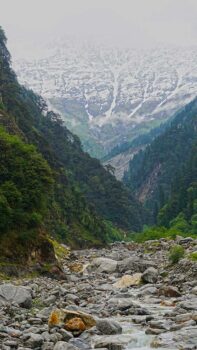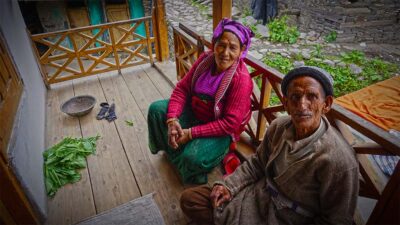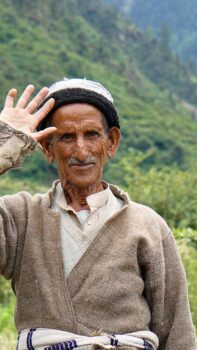By NVC’s Scott Walker
Over the summer I was “kidnapped” while trekking outside of an ancient village in the remote Indian Himalaya. I kid you not.
In 2019, I wrote a research fellowship proposal to the American Institute of Indian Studies and was selected to conduct the project for the summer of 2020. Of course, we had a pandemic that delayed the project for two years. However, in June this year I finally set out for the Indian Himalaya. It took nearly a week of travel by airplane, taxi, tuk tuk, moped, and jeep to arrive in the village of Kharsali in the mountainous Indian state of Uttarakhand. Kharsali is at the literal end of the road where a trail begins that leads Hindu pilgrims to the holy site of Yamunotri—the seat (dhama) of the goddess Yamuna who is embodied in the glacial meltwaters of the river named after her.This region of northern India is referred to as the devbhumi—abode of the gods—with the dhama being situated above 3,000 m (9,842 ft) in elevation. On a day when I was not working, I decided to trek up the trail running alongside the Hiranyabahu River, a rushing whitewater river the feeds the Yamuna River downstream from Kharsali. The trail runs through ancient wheat and potato terraces sculpted into the mountainside. Many of the terraced fields have been abandoned and the trail is somewhat neglected. Nevertheless, I wanted to see where the trail led. That’s when an old man, about as ancient as the terraces, passed me on the trail. He smiled as he passed but did not otherwise acknowledge me. I thought to myself “I hope I’m that nimble when I’m his age.”
About five minutes later the man returned down the trail toward me while I was photographing the river valley. He stopped to watch me for a moment. I asked him if I could take his picture and he agreed. After a few photos he gestured back to the village while saying a long string of words in a language I did not comprehend other than the word “chai” (tea). Being a kilometer from the village, I really did not want to walk back for tea, however, he insisted. In fact, he took me by the hand and with his strong grip turned me around and led me back down the trail saying something that ended in the word “chai.” He did not let go of my hand for the longest time. That is when I knew I had been “kidnapped.”
***
To read more about Scott’s kidnapping (that resulted in no crime), go here, scroll down until you see the Kidnapping headline. To read his autoethnography, go to Scott’s project page where you find images, videos, and more.
If any faculty would like Scott to speak to their class on qualitative research methods, Hindu pilgrimages, informal economics of India, or northern India in general, please let him know, swalker6@alamo.edu.
Scott L. Walker, ScEdD
Professor/Coordinator, Geography & Environmental Studies
International Faculty Fellow, Office of International Programs



